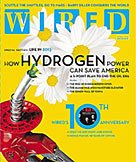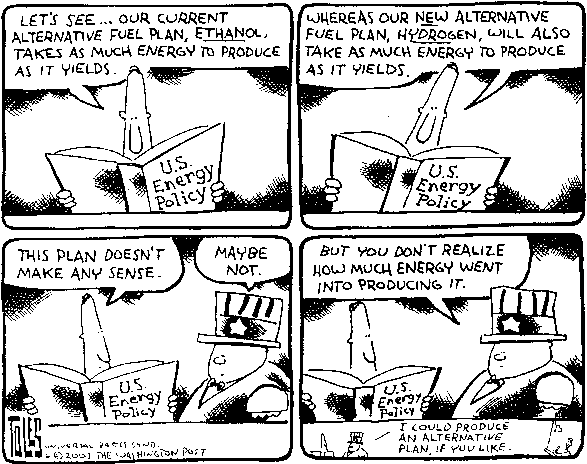The politics of the hydrogen economy
Hydrogen seems to promise clean air, a reduction in the need
for Middle East oil, a reduction in greenhouse gas emissions and good jobs
for Americans. This is very seductive to most Americans. There
is wide spread interest and numerous websites, books, and magazine
articles are devoted to the subject.
President Bush announced the FreedomCar and
FreedomFuel Initiative in the State of the Union Address of January,
2003. [1]
 How
Hydrogen Can Save America appeared in the April 2004 issue of Wired. [2]
The authors propose a program equal in scope to the Apollo program that
put men on the moon. They have been seduced too. Here is the introduction: How
Hydrogen Can Save America appeared in the April 2004 issue of Wired. [2]
The authors propose a program equal in scope to the Apollo program that
put men on the moon. They have been seduced too. Here is the introduction:
The cost of oil dependence has never been so
clear. What had long been largely an environmental issue has suddenly
become a deadly serious strategic concern. Oil is an indulgence we can
no longer afford, not just because it will run out or turn the planet
into a sauna, but because it inexorably leads to global conflict.
Enough. What we need is a massive, Apollo-scale effort to unlock the
potential of hydrogen, a virtually unlimited source of power. The
technology is at a tipping point. Terrorism provides political urgency.
Consumers are ready for an alternative. From Detroit to Dallas, even the
oil establishment is primed for change. We put a man on the moon in a
decade; we can achieve energy independence just as fast. Here's how.
The Hydrogen Economy: The Creation of the
Worldwide Energy Web and the Redistribution of Power on Earth, a
popular book by Jeremy Rifkin, is an example. [3]
The subtitle suggests that Rifkin has been seduced by hydrogen. It seems
worthwhile to include a review of Rifkin's book that appeared in the
March-April 2003 issue of American Scientist.
The age of oil is about to end, which will come as
a surprise to most people. Depletion of the rest of the fossil fuels may
not be far behind. And if we do go on merrily burning up the planet's
legacy, the result may be irreversible damage to our climate. This
crucially important idea is the starting point of The Hydrogen Economy,
a new book by Jeremy Rifkin, a former peace advocate who now crusades
against biotechnology and various other perceived ills.
Rifkin believes that oil will be replaced by
hydrogen fuel cells. Unlike the oil economy, which requires a top-down,
capitalist-corporate order, the hydrogen economy will be something like
the Internet, he says, with users who are also providers, generating
their own hydrogen and sharing any surplus on the Hydrogen Energy Web.
After all, unlike oil, hydrogen is everywhere: It's the most common
element in the universe, the "forever fuel" that we can never
run out of. The revolution brought about by the hydrogen economy will
lead to a democratization of society and give a whole new meaning to the
word globalization.
But wait a minute. Doesn't Rifkin understand that
it takes energy to generate hydrogen from water, or from any other
source? Well, yes, he even says so in a couple of places, but he seems
to have trouble holding that thought. And when he does come to grips
with it, he believes all the energy will come from "renewable
resources-photovoltaic, wind, hydroelectric, geothermal, and
biomass." There will be no nuclear reactors in a world designed by
Jeremy Rifkin. At present, all the renewables on Rifkin's list aside
from hydroelectricity collectively generate less than 1 percent of our
energy needs.
Is Rifkin's proposed solution physically possible?
Well, yes, sort of, but it's extremely implausible that all the power
generated today by fossil fuels, about 10 terawatts worldwide, could
ever be replaced from those sources. Biomass is a terribly inefficient
use of sunlight. There are only a few places on Earth where enough
geothermal energy to generate electricity is within drilling distance of
the surface. Hydroelectric capacity is already saturated, and wind is an
intermittent, low-density (and often ugly) source of power. According to
an article by Martin I. Hoffert and colleagues in the November 1, 2002,
issue of Science (298:981-987), to replace the 10 terawatts with
photovoltaics would require an array covering more than 200,000 square
kilometers, whereas all the photovoltaic cells shipped between 1982 and
1998 would cover only 3 square kilometers.
Our best hope in the short run is that somebody
will start building nuclear power plants in a hurry, before the oil
starts to run out. In the longer run, when the fossil fuels are gone or
sequestered and the uranium starts to run low, if we haven't yet brought
thermonuclear energy under control, heroic measures like huge arrays of
photovoltaics on Earth, or somewhat smaller ones in space (where the
solar flux is about 8 times the average at the Earth's surface), may be
in order. That is not to say we should not do our best to develop
renewable energy sources. We certainly should. But they will not replace
fossil fuels anytime soon.
Rifkin is certainly right to say that we will soon
start running out of oil, that continued burning of fossil fuels is a
grave threat to the Earth's climate, and that hydrogen, either in fuel
cells or by combustion, is the best bet for the future of
transportation. He has correctly identified the biggest problem we have.
But this book is not part of the solution.-David Goodstein, Physics,
California Institute of Technology
Turning food into ethanol and turning
ethanol into hydrogen

Surplus corn can be turned into ethanol by
fermentation. Ethanol can be added to gasoline to increase the octane
rating and lower emissions. (Ethanol also lowers mileage.) It seems like a
good idea. Farmers would benefit, the environment would benefit, and an
agricultural surplus would be consumed. This is an idea that plays very
well in agricultural states. But it takes natural gas to make fertilizer,
herbicides, and insecticides to grow corn. The farmer needs oil to run
agricultural machinery. The corn must be harvested and transported using
oil powered machinery. An energy source is needed to triple distill the
ethanol. When the energy content of the oil and gas is subtracted from the
energy content of the the ethanol, the
result is negative! [4]
Subsidizing ethanol derived from corn does not reduce dependence on OPEC
oil. This is an example of an energy returned over energy invested (EROEI)
calculation.
It is possible to derive hydrogen from ethanol using
a process called "reforming." Hydrogen economy advocates suggest
that a hydrogen economy could be sustained in this way. But part of the
chemical energy in ethanol is lost when the ethanol is reformed. That
makes the EROEI calculation even more unfavorable.
Other takes on the hydrogen economy

 Tom
and Ray Magliozzi are approachable MIT graduates. They are syndicated
nationally and they have a show on public radio called Car Talk. Tom
and Ray Magliozzi are approachable MIT graduates. They are syndicated
nationally and they have a show on public radio called Car Talk.
Dear Tom and Ray:
President Bush talked about a "hydrogen
car" in his State of the Union address. Is this a realistic
possibility during the Bush administration? -- Jim
Ray: Maybe during the Jenna Bush
administration, Jim. The technology itself works, but people "in
the know" say it's going to be at least 20 years before
hydrogen-powered cars are viable on a large scale -- if then.
Tom: The main problems are: (1) the fuel
cell "stacks" are still incredibly expensive to build, (2) the
range of the cars is insufficient and (3) there's no national
infrastructure (like gas stations) to support hydrogen. So it's not
going to happen anytime soon.
Ray: So, why is the president talking about
hydrogen-powered cars? Well, in my humble opinion, he's creating a
distraction.
Tom: I think so, too. You probably know
that we now import boatloads of foreign oil every day. And almost
everybody agrees that this is not a good thing (except for the countries
that sell us the oil). So what do you do about it?
Ray: Well, you can try to find more oil
here at home, by drilling in Alaska's forests, for instance. Or you can
force people to use less oil. The president knows that both of these
options are pretty unpopular. So he's doing what any good politician
would do: He's changing the subject.
Tom: Here's another reason why he might
want to distract us from thoughts of fuel economy and foreign oil. With
no pressure on American car companies to increase gas mileage, the
Japanese have taken a significant lead in the most important new
propulsion technology in decades: hybrid engines. Hybrid engines use
battery power some of the time and gasoline power at other times, and
they never have to be plugged in. They're a great way to increase
mileage without sacrificing power or convenience. And you're going to
see Americans adopting them in big numbers over the next five to 10
years.
Ray: Who makes the best-selling hybrid cars
in America? Honda and Toyota. So, instead of urging America to make more
fuel-efficient cars and cut down on foreign oil by raising the Corporate
Average Fuel Economy (CAFE) standards, or urging U.S. manufacturers to
catch up with the Japanese on hybrids -- which would make a huge
difference right away -- the president's talk about hydrogen cars is,
essentially, the old "Hey, everybody, look over there!"
Here is a cartoonist's take on the hydrogen
economy.


Summary

The Bush Administration calls hydrogen "Freedom
Fuel." They think it can solve all problems including reelection.
The Democratic candidates propose a Manhattan Project to put Americans to
work and to solve a lot of other problems including the election of a
Democratic president. Rifkin thinks that the hydrogen can empower people
and create a new kind of democracy. Schwartz and Randall think that Apollo
style program can solve hydrogen's problems.
But they are all seduced and
they are all wrong. None have given a satisfactory quantitative
answer to the question; Where
will the energy come from? |

[1] http://www.eere.energy.gov/hydrogenfuel/
You could have learned about the Bush administration's hydrogen economy
plan in 2003, but it has been taken down.
[2] http://www.wired.com/wired/archive/11.04/hydrogen.html
How Hydrogen can Save America, by Peter Schwartz and Doug Randall.
The authors call for an Apollo--style program to develop the hydrogen
economy.
[3] Other books by the prolific Jeremy
Rifkin include Beyond Beef: The Rise and Fall of the Cattle
Culture, End of Work: The Decline of the
Global Labor Force and the Dawn of the Post-Market Era, Biotech
Century: Harnessing the Gene and Remaking the World, and The Age of Access.
[4] http://www.news.cornell.edu/releases/Aug01/corn-basedethanol.hrs.html
Ethanol fuel from corn is faulted as "unsustainable subsidized
food burning" in an analysis by Cornell scientists.

|
![]()